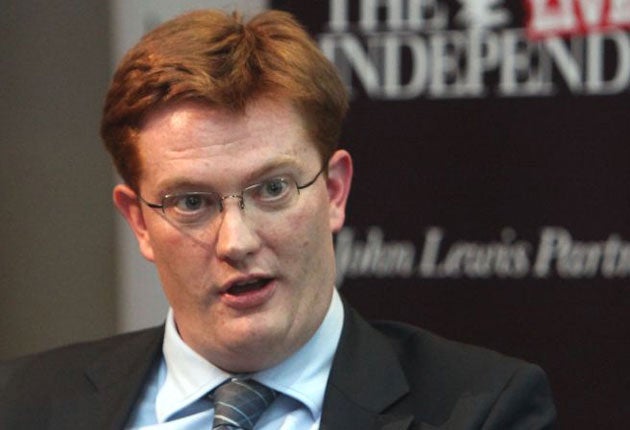Danny Alexander tells public sector: work longer and get less
Ministers plan to end final-salary schemes in the public sector and link retirement to state pension age rules

Public sector employees will be told today that most of them will have to work six years longer than expected before they qualify for pensions. That will inflame the incendiary relations between ministers and public sector unions, four of which are preparing for a co-ordinated one-day strike by about 750,000 staff on 30 June.
All but the lowest-paid state employees will also face steep rises in pension contributions from next year as ministers press defiantly ahead despite the threat of escalating strikes. Danny Alexander, the Chief Secretary to the Treasury, will condemn the "minority of unions who seem hell bent on premature strike action before discussions are even complete".
He will announce that the public sector pension retirement age will be linked for the first time to the state pension, meaning it will rise to 65 in 2015 and 66 in 2020. Police, the Armed Forces and fire services will be excluded from the change.
Mr Alexander will stress that pension rights already built up will not be affected, but will add: "It is unjustifiable to ask the taxpayer to work longer and pay more so that public sector workers can retire earlier and receive more."
Under the plans, most public sector workers will pay an extra 3.2 per cent of their salaries into their pensions by 2014. The higher contributions will be phased in over two years, starting next April. Workers earning less than £15,000 a year – some 750,000 state employees – will be exempt from higher contributions, and some 500,000 employees earning between £15,000 and £18,000 will have their contribution increases capped at 1.5 per cent.
Ministers have already signalled their intention to scrap final-salary pension schemes in the public sector. Mr Alexander will confirm plans to shift to career-average schemes rather than the defined average schemes common in private companies. In a speech today, he will promise that retirement benefits will stay "broadly as good as they are now" for low- and middle-income public sector staff.
The strike on 30 June will be by members of three large teaching unions and the public sector union PCS, which represents staff in a wide range of government offices. Other unions, including the largest public sector one, Unison, and the Prison Officers' Association, have declared support for the strikers' cause.
The battle over pensions is the biggest single cause of industrial strife but not the only one. Talks were under way yesterday between unions and managers at Southampton council, where refuse collectors, street cleaners and toll-bridge collectors walked out more than three weeks ago over a planned pay cut the Conservative council says is necessary to avoid 400 job losses.
Managers on the London Underground have also appealed to the rail union, RMT, to call off a planned series of one-day strikes in a dispute over the sacking of a driver.
Subscribe to Independent Premium to bookmark this article
Want to bookmark your favourite articles and stories to read or reference later? Start your Independent Premium subscription today.

Join our commenting forum
Join thought-provoking conversations, follow other Independent readers and see their replies